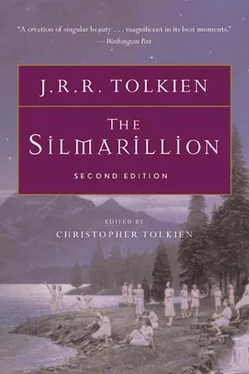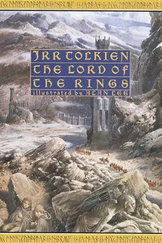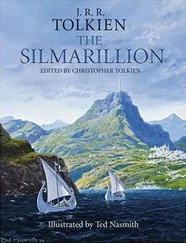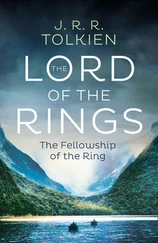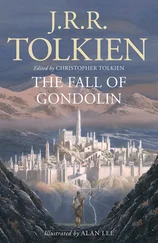dôr ‘land’ (i.e. dry land as opposed to sea) was derived from ndor ; it occurs in many Sindarin names, as Doriath, Dorthonion, Eriador, Gondor, Mordor , etc. In Quenya the stem was blended and confused with a quite distinct word nórë meaning ‘people’; in origin Valinórë was strictly ‘the people of the Valar’, but Valandor ‘the land of the Valar’, and similarly Númen(n)órë ‘people of the West’, but Númendor ‘land of the West’. Quenya Endor ‘Middle-earth’ was from ened ‘middle’ and ndor ; this in Sindarin became Ennor (cf. ennorath ‘middle lands’ in the chant A Elbereth Gilthoniel ).
draug ‘wolf’ in Draugluin .
dú ‘night, dimness’ in Deldúwath, Ephel Dúath . Derived from earlier dome , whence Quenya lómë ; thus Sindarin dúlin ‘nightingale’ corresponds to lómelindë .
duin ‘(long) river’ in Anduin, Baranduin, Esgalduin, Malduin , Taur-im-Duinath .
dûr ‘dark’ in Barad-dûr, Caragdûr, Dol Guldur ; also in Durthang (a castle in Mordor).
ëar ‘sea’ (Quenya) in Eärendil, Eärrámë , and many other names. The Sindarin word gaer (in Belegaer ) is apparently derived from the same original stem.
echor in Echoriath ‘Encircling Mountains’ and Orfalch Echor ; cf. Rammas Echor ‘the great wall of the outer circle’ about the Pelennor Fields at Minas Tirith.
edhel ‘elf’ (Sindarin) in Adanedhel, Aredhel, Glóredhel, Ost-in-Edhil ; also in Peredhil ‘Half-elven’.
eithel ‘well’ in Eithel Ivrin, Eithel Sirion, Barad Eithel ; also in Mitheithel , the river Hoarwell in Eriador (named from its source). See kel -.
êl, elen ‘star’. According to Elvish legend, ele was a primitive exclamation ‘behold!’ made by the Elves when they first saw the stars. From this origin derived the ancient words êl and elen , meaning ‘star’, and the adjectives elda and elena , meaning ‘of the stars’. These elements appear in a great many names. For the later use of the name Eldar see the Index. The Sindarin equivalent of Elda was Edhel (plural Edhil ), q.v.; but the strictly corresponding form was Eledh , which occurs in Eledhwen .
er ‘one, alone’, in Amon Ereb (cf. Erebor , the Lonely Mountain), Erchamion, Eressëa, Eru .
ereg ‘thorn, holly’ in Eregion, Region .
esgal ‘screen, hiding’ in Esgalduin .
falas ‘shore, line of surf’ (Quenya falassë ) in Falas, Belfalas ; also Anfalas in Gondor. Cf. Falathar, Falathrim . Another derivative from the root was Quenya falma ‘(crested) wave’, whence Falmari, Mar-nu-Falmar .
faroth is derived from a root meaning ‘hunt, pursue’; in the Lay of Leithian the Taur-en-Faroth above Nargothrond are called ‘the Hills of the Hunters’.
faug- ‘gape’ in Anfauglir, Anfauglith, Dor-nu-Fauglith .
fëa ‘spirit’ in Fëanor, Fëanturi .
fin- ‘hair’ in Finduilas, Fingon, Finrod, Glorfindel .
formen ‘north’ (Quenya) in Formenos ; Sindarin forn (also for, forod ) in Fornost .
fuin ‘gloom, darkness’ (Quenya huinë ) in Fuinur, Taur-nu-Fuin .
gaer ‘sea’ in Belegaer (and in Gaerys , Sindarin name of Ossë). Said to derive from the stem gaya ‘awe, dread’, and to have been the name made for the vast and terrifying Great Sea when the Eldar first came to its shores.
gaur ‘werewolf’ (from a root ngwaw- ‘howl’) in Tol-in-Gaurhoth .
gil ‘star’ in Dagor-nuin-Giliath, Osgiliath ( giliath ‘host of stars’); Gil-Estel, Gil-galad .
girith ‘shuddering’ in Nen Girith ; cf. also Girithron , name of the last month of the year in Sindarin ( The Lord of the Rings Appendix D).
glîn ‘gleam’ (particularly applied to the eyes) in Maeglin .
golodh is the Sindarin form of Quenya Noldo ; see gûl . Plural Golodhrim , and Gelydh (in Annon-in-Gelydh ).
gond ‘stone’ in Gondolin, Gondor, Gonnhirrim, Argonath, seregon . The name of the hidden city of King Turgon was devised by him in Quenya as Ondolindë (Quenya ondo = Sindarin gond , and lindë ‘singing, song’); but it was known always in legend in the Sindarin form Gondolin , which was probably interpreted as gond-dolen ‘Hidden Rock’.
gor ‘horror, dread’ in Gorthaur, Gorthol ; goroth of the same meaning, with reduplicated gor ,in Gorgoroth, Ered Gorgoroth .
groth (grod) ‘delving, underground dwelling’ in Menegroth , Nogrod (probably also in Nimrodel , ‘lady of the white cave’). Nogrod was originally Novrod ‘hollow delving’ (hence the translation Hollowbold ), but was altered under the influence of naug ‘dwarf’.
gûl ‘sorcery’ in Dol Guldur, Minas Morgul . This word was derived from the same ancient stem ngol - that appears in Noldor ; cf. Quenya nólë ‘long study, lore, knowledge’. But the Sindarin word was darkened in sense by its frequent use in the compound morgul ‘black arts’.
gurth ‘death’ in Gurthang (see also Melkor in the Index).
gwaith ‘people’ in Gwaith-i-Mirdain ; cf. Enedwaith ‘Middle-folk’, name of the land between the Greyflood and the Isen.
gwath, wath ‘shadow’ in Deldúwath, Ephel Dúath ; also in Gwathló , the river Greyflood in Eriador. Related forms in Ered Wethrin, Thuringwethil . (This Sindarin word referred to dim light, not to the shadows of objects cast by light: these were called morchaint ‘dark shapes’.)
hadhod in Hadhodrond (translation of Khazad-dûm ) was a rendering of Khazâd into Sindarin sounds.
haudh ‘mound’ in Haudh-en-Arwen, Haudh-en-Elleth , etc.
heru ‘lord’ in Herumor, Herunúmen ; Sindarin hîr in Gonnhirrim , Rohirrim, Barahir ; híril ‘lady’ in Hírilorn .
him ‘cool’ in Himlad (and Himring ?).
híni ‘children’ in Eruhíni ‘Children of Eru’; Narn i Hîn Húrin .
hîth ‘mist’ in Hithaeglir, Hithlum (also in Nen Hithoel , a lake in Anduin). Hithlum is Sindarin in form, adapted from the Quenya name Hísilómë given by the Noldorin exiles (Quenya hísië ‘mist’, cf. Hísimë , the name of the eleventh month of the year, The Lord of the Rings Appendix D).
hoth ‘host, horde’ (nearly always in a bad sense) in Tol-in-Gaurhoth ; also in Loss(h)oth , the Snowmen of Forochel ( The Lord of the Rings Appendix A (I, iii)) and Glamhoth ‘din-horde’, a name for Orcs.
Читать дальше
